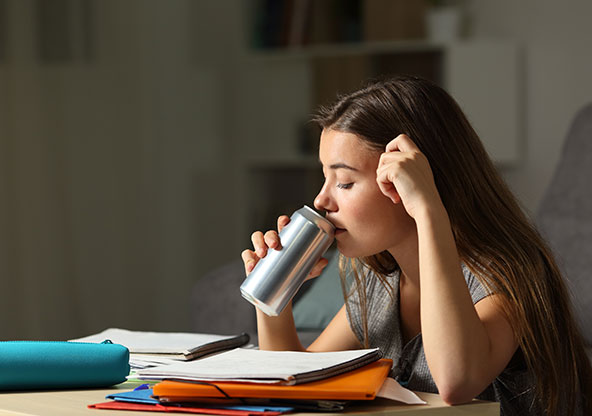How Much Caffeine is Too Much for My Teen?
By Dr. Ruchi Kaushik, MD, MPH
Pediatric Primary Care Physician
Director, ComP-CaN (Comprehensive Peds for Complex Needs)
CHRISTUS Children’s
Today’s teens are on the go. In my own home, we juggle piano, Tae Kwon Do, violin, dance, and running 5Ks with schoolwork, eating healthy family dinners, sleep, and, of course, having fun and being a kid!
Of those activities, sleep is most likely the first to be neglected, and teens often turn to caffeine and energy drinks to stay alert and in action. But how much caffeine is too much and what’s in energy drinks anyway?
What is caffeine and what does it do?
Caffeine is a stimulant found in coffee, tea, colas, and energy drinks and is known to enhance performance in adults; however, it has not been studied in children and teens. It raises heart rate, blood pressure, and temperature; helps improve attention and wakefulness; and prevents fatigue.
Athletes who drink caffeinated beverages, but not enough water, can easily become dehydrated. While it enhances alertness, caffeine can result in insomnia and other sleep disturbances. People prone to anxiety can experience worsening in their anxiety. And caffeine can be fatal by triggering an arrhythmia – an abnormal rhythm of the heart.
Caffeine is addictive and children and teens who drink it regularly can experience withdrawal symptoms (such as headache, fatigue, and irritability) when they stop.
What about energy drinks?
Energy drinks contain caffeine, but they also contain guarana and taurine. Guarana itself contains caffeine and taurine has the same effect on the heart as caffeine does. There is often no way of knowing how much stimulant an energy drink contains because caffeine, guarana, and taurine all have the same effects on the heart and energy drink labels rarely describe how much caffeine they contain.
How much is too much?
Because of the effects of caffeine on the brain and heart, the American Academy of Pediatrics recommends that these beverages are not appropriate for children and teens and should never be consumed.
What is the best way for children and teens to stay alert and focused?
A healthy diet that includes a variety of whole grains, fresh fruits and vegetables, low-fat or fat-free dairy, and lean meats; adequate water intake; and sufficient sleep (8-10 hours for teens) is the most effective method to keep your child active and in motion.
If you are concerned about your teen’s consumption of caffeine, talk to your child’s doctor about ways to curb their coffee or soda habit. If you need to find a pediatrician, visit this page for a doctor near you.
